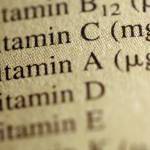Fat-Soluble Vitamins in Equine Diets

Vitamins for horses can be classified into two major categories that describe how they are absorbed, stored, and excreted. These categories are fat-soluble and water-soluble. Fat-soluble vitamins (A, D, E, and K) should not be supplemented in excess because they can accumulate and some may have adverse effects, but all have important purposes in the horse’s body.
Vitamin A is indispensable for support of growth and health of a horse. Deficiency causes defects in the growth of bone and epithelial tissues, and lowered resistance to disease and infection. Carotenes are the natural source of vitamin A for the horse because they are found in abundance in green forages.
Very little research has been done on supplementing performance horses with vitamin A, but look for a supplement containing at least 40,000 IU/day of vitamin A or a feed supplying more than 10,000 IU/kg.
Vitamin D is produced in the horse’s skin when adequate sunlight is received. Sufficient vitamin D must be present for calcium and phosphorus to be absorbed; a vitamin D deficiency markedly reduces absorption of both minerals. Insufficient photoproduction of vitamin D3 or inadequate dietary supplementation of vitamin D leads to improper calcification of bones.
Vitamin D is added to horse supplements and feeds. No absolute requirement has yet been established for the horse. Optimal supplementation for horses with limited access to sunlight is not yet known.
Vitamin E is a nontoxic, fat-soluble vitamin that has an important role in many physiological functions such as reproduction, immune response, and nerve and muscle function. It also has overlapping yet independent roles with selenium, an essential trace mineral. Together they act to maintain normal muscle function, aid in the prevention of muscular disease, and perform as antioxidants to protect body tissues, particularly cell membranes, enzymes, and other intracellular substances, from oxidation-induced damage.
Vitamin E is abundant in green, growing pastures. The content diminishes with plant maturation and harvesting. It is common practice to supplement animal feeds with vitamin E, and feeds or supplements should contain sufficient vitamin E to supply at least 1,000 IU per day.
Vitamin K is important for blood clotting and will help reduce abnormal bleeding. Recently, vitamin K has also been found to have a role in the activation of a number of other proteins throughout the body, some specifically identified in the skin and bone. This includes osteocalcin, which is responsible for facilitating bone mineralization, so vitamin K could have a positive effect on bone formation.
Pasture and/or hay should provide more than adequate quantities of vitamin K for most horses, but research into any benefits of supplementation after injury to bone is needed. Conditions that interfere with vitamin K function include gastric ulcers, mycotoxins in the feed, rodenticides, and long-term antibiotic treatment.








